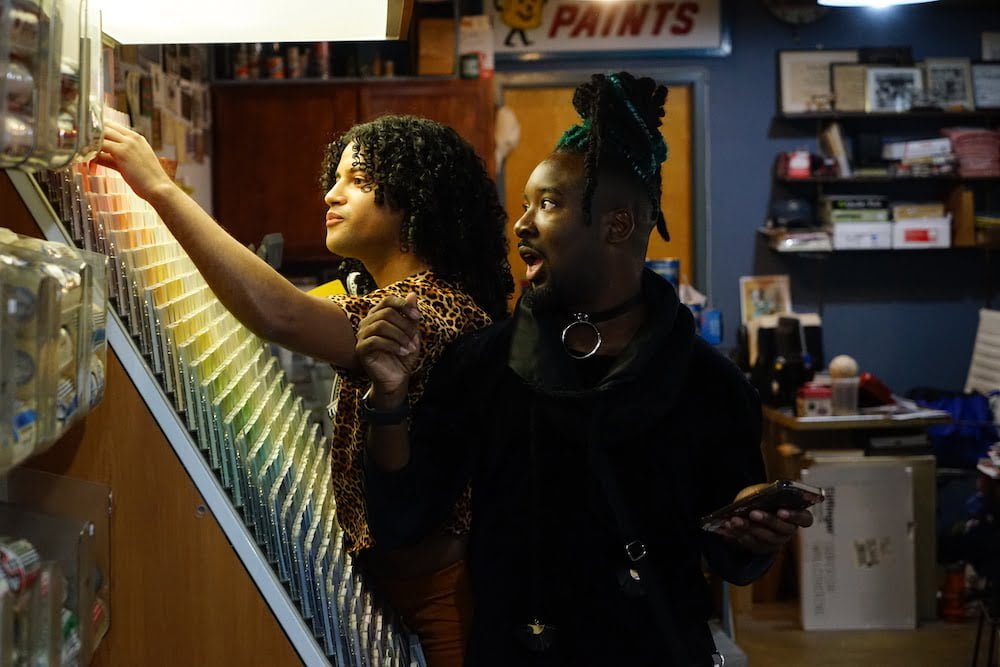“This hood isn’t anything like how it used to be,” Officer Garcia is telling me and a teenage girl named Sam, as I watch the two of them play basketball in the gym of the Police Athletic League on West 52nd Street, in the neighborhood that used to be called Hell’s Kitchen. “Back in the 70s and 80s, it was nothing but gangs, prostitution, drugs.”
Now it’s nothing but theater.
At least that’s how it felt the evening I saw “Foul Shots” by Christin Eve Cato, one of the six, short site-specific new plays produced by Intar Theatre for its MicroTEATRO Festival. This first-ever festival turned out to be a wonderful way to celebrate the reopening of in-person theater. I feel privileged to have experienced what felt like a promising example of the “reimagined theater” that people have been hoping will emerge post-pandemic.
In this case, the theater is being reimagined as a neighborhood affair, by a company that has been in the neighborhood producing Latino voices in English since 1966. Each of the six plays, none longer than 15 minutes, is being presented in a single evening, inside and outside actual storefronts – a meat market, a paint shop, a gymnasium, a former lumber supply store — within a few blocks of one another, for audiences no larger than four at a time.
I happened to be the only audience member for the performance I saw of “Foul Shots,” which was the last of the four plays I was able to see, and greatly satisfying, because of how much both the playwright and director Itzel Ayala take advantage of the specific site, officially named the Patrolman William J. Duncan Police Athletic League (P.A.L.) Center. This is not just the use of the history of the neighborhood. On the surface, Officer Garcia (Ashley Marie Ortiz) is simply showing Sam (Maria Renee Lavalle Mendez) how to shoot a basket, but Officer Garcia is also looking to help the teenager, having learned she has been stealing food from the center. That they are actually shooting baskets helps make the revelations in the play – Sam’s unfortunate situation; its parallels to Garcia’s own background – unfold more naturally than had the actors been forced to pantomime the action. Despite the compressed time, it’s even possible to believe Sam’s transformation, albeit modest, from suspicious, sullen and resentful teenager. And then there’s this lovely coda, which turns the setting into a metaphor: “When someone fouls you, there’s always an opportunity for a free throw.”
There is a different kind of transformation in “Epstein’s Paint” by Julissa Contreras, which, unsurprisingly takes place at Epstein’s Paint Center, a one-minute walk from the Police Athletic League. Jojo and Mickey (Sijean Gonzalez and Alexander Lambie) are hilariously throwing shade at one another, while comparing shades of pink of the paint swatches in the back of the store. The two are theatrical theater designers, or at least assistant designers, helping out on “a drag show with an anime theme.” It eventually becomes clear that Mickey has a crush on the set designer and is trying to impress them. If Jojo and Mickey start off as bitchy, and maybe a bit drunk (“stank ass mimosa breath,” Jojo says to Mickey), Mickey turns out to be sincere and reflective, and Jojo supportive. The transformation in this case occurs not with the characters, but with the audience’s understanding of their relationship.
In “#Emperorof10thAvenue,” Sonny, the proprietor of Sonny’s 10th Avenue Meat Market, and his daughter Sonia, are talking from behind the counter what Hell’s Kitchen used to be like, and how gentrification doesn’t bother him.
“Yeah…the neighborhood changed, but what hasn’t changed is that people have to eat at least 1008 meals a year. And as long as we are living, Sonny’s 10th Avenue Meat Market will have its door open.”
The language sounded authentic enough, and its delivery persuasive enough that for a while I thought these two might actually be who they say they are (but no, Sonny is portrayed by Dylan Arredondo and Sonia, who does most of the talking, by Camila Pérez) – but it became more obviously a play (by Carmen Rivera) when Sonny’s assistants, and customers, and passing police officer, were all portrayed by the same actress (Daniela Thome)
“Baby Steps,” by Caridad Svich, was the first play I saw in the evening, and the trickiest. Three of us entered the office of the Housing Conservation Coordinators, a nonprofit that assists individuals and organizations in the neighborhood, and each of us given a form about to sign – which I’ve become used to signing, about not having any symptoms of COVID or interacting with anybody with COVID, etc.
When another woman entered, it became clear that one of the three of “us” was actually an actor, not an audience member. The two strangers wind up talking about gentrification, and colonization, and climate change – and what can be done about the problems of the neighborhood and the world.
“Petitions, protests,” says the woman (Ashley Alvarez) “All these things. I do them. I march. But I have to pay rent, too. Sometimes I am exhausted from living, and I do not have the energy to do all these things that need to be done to change the world.”
“Baby steps,” answers the man (Michael León)
“How’s that?”
“We can make baby steps. Towards changing things.”
“ How many baby steps will it take?”
“Six hundred and seventy-five billion.”
“You have an exact number?”
“I pulled it out of the air.”
It’s a lovely piece, but its connection to its specific site feels at most thematic – they care about trying to fix things, as does the organization whose office we were occupying. But snippets of their conversation led me to believe that this play was written to take place in a local park, which (acoustics and gnats under control) might have made more sense.
Intar got its inspiration for the MicroTEATRO festival from the kind of brief, everyday theater that Intar’s artistic director Lou Moreno saw in Mexico City — brief plays that took place in people’s apartments. “They see plays differently there,” he told me. We were chatting informally during what I can call one of the intermissions, on the sidewalk of Ardesia Wine Bar, which functions as kind of the hub for the festival, a place to hang out until the next performance. This has its pluses and minuses. There is a half hour break after each performance of the plays. So the four plays I saw, with a total running time of maybe 40 minutes, kept me in the neighborhood for more than two and a half hours.
Still, the couple I passed by (Andres Nicolas Chavez and Kaelyn A. Gonzalez) salsa dancing in the middle of 52nd Street, behind a white van with all its doors open — convinced me I should try to return next week to see “LeNOBLE,” which is a play by C. Quintana, taking place on the street in front of the storefront once occupied by the lumber store. Unfortunately, MicroTEATRO will only be repeated twice more — next Thursday and Friday June 24 and 25. Yes theater is evanescent. But MicroTEATRO deserves an audience; and New York’s long-deprived theater audiences deserve MicroTEATRO.
it may interest you:
- THE HANGOVER REPORT – Whether you like it or not, the sensational new rock musical OSO FABULOSO & THE BEAR BACKS! may just be the next “Hedwig”
- INTAR Theater Takes To The Streets
- Hell’s Kitchen Businesses Take Center Stage in INTAR’S MicroTEATRO Festival
- Review: Oso Fabuloso & the Bear Backs! Reclaims New York’s Rock and Roll Spirit
- Reopen Theatre? Why Not a Whole Neighborhood?
Source: Newyorktheater Info

